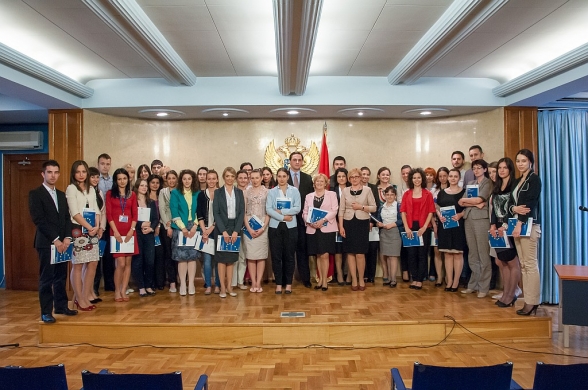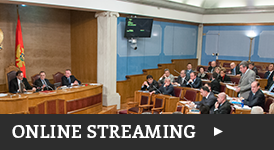Yesterday, at the Ceremony held on the occasion of successful implementation of the two-year project, the Secretary General of the Parliament of Montenegro Mr Damir Davidović, the Ambassador of Great Britain to Montenegro H.E. Ms Catherine Knight-Sands and the Director of the British Council in Montenegro Ms Vanja Madžgalj presented the Self-Study Toolkits to the employees of the Parliament of Montenegro, participants in professional training in the joint project of the Parliament of Montenegro, the British Embassy and the British Council.
Thus officially ended the final stage of the project for strengthening the administrative capacities of Montenegrin Parliament, successfully completed by more than 40 participants in the past two years, as much as the project lasted. Implementation of the project was financially backed by the Embassy of Great Britain in Montenegro.
Secretary General of the Parliament of Montenegro Mr Damir Davidović pointed out that the implementation of this project represented a high quality example of cooperation with the international partners in order to strengthen professional capacities of the Service of the Parliament of Montenegro. He expressed his gratitude to the Embassy of Great Britain in Montenegro and the British Council for their support in implementing this project and pointed out that, apart from dedication of partners in this project, its timeliness and compliance with the priorities of the Parliament especially contributed to its success and quality of the implementation. The Parliament of Montenegro sees strengthening of administrative capacities as one of its key priorities, through a process in which the employees, by acquiring new skills, also open new areas for improvement in their specific working fields, and all that in order to offer more quality support to MPs.
The Ambassador of the Great Britain to Montenegro H.E. Ms Catherine Knight-Sands congratulated the participants on the successfully completed project because, as she said, she was aware that everyone gave their best and worked hard on acquiring new knowledge and development of professional skills. She pointed out that it was undisputable that the parliamentarians needed a more professional administrative help, both due to obligations that stem from the European integration process, and due to increasingly important role that the parliaments have in modern democracies. With that in mind, strengthening capacities of parliamentary administration and total state administration in order to improve the quality of work and professionalism is certainly one of the significant priorities for a country in the process of European integration. She also pointed out that the Great Britain strongly supports Montenegro on this path.
Prior to presenting the handbooks, the Director of the British Council in Montenegro Ms Vanja Madžgalj reminded that the projects represented a complex programme, envisaged and implemented in such a manner so that the acquired knowledge can be completely applicable to the daily work of the participants. Ms Madžgalj also pointed out that a very important component of the programme was that fact that a certain number of participants additionally completed the training for trainers, so they could transfer their knowledge to their colleagues by themselves. Apart from this, the handbook itself had been created for individual professional development which ensures the long term sustainability of the project. Finally, she pointed out the very useful cooperation achieved between the Parliament of Montenegro and the British Council on implementation of this project.
In the late 2011, a Memorandum between the Parliament of Montenegro and the British Council was signed, defining the cooperation programme consisting of trainings in the field of formal correspondence, presentation skills, EU working groups meetings, effective negotiation techniques, and institutional PR and media relations. The trainings had been attended by 47 employees of the Service of the Parliament of Montenegro, one MP and two employees of the MP Groups.











